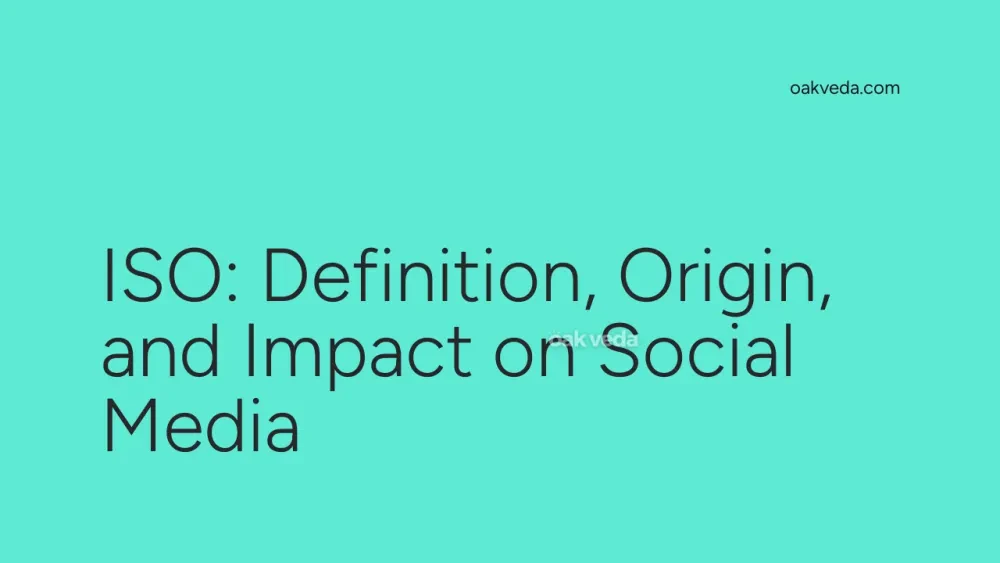
What is ISO?
ISO is an acronym that stands for "In Search Of" in social media and online communication. This shorthand term is widely used across various digital platforms, including social networks, online forums, and classified ad websites. ISO serves as a quick and efficient way for users to indicate that they are looking for a specific item, service, or information.
Origin and Development of ISO
The use of ISO as an abbreviation for "In Search Of" predates social media and can be traced back to classified ads in newspapers and early online bulletin boards. However, its popularity exploded with the rise of social media platforms and online marketplaces. As these platforms emphasized brevity and quick communication, ISO became an invaluable tool for users to express their needs concisely.
How ISO Works
When someone uses ISO in a post or comment, they are essentially broadcasting a request to their network or a specific community. For example:
- "ISO: Graphic designer for logo creation"
- "ISO recommendations for best sushi restaurants in NYC"
- "ISO: Used mountain bike, size medium"
This format allows users to quickly convey their needs without lengthy explanations, making it easier for others to respond if they can help or have relevant information.
Popular Examples of ISO
ISO is versatile and can be used in various contexts:
- Marketplace listings: "ISO: iPhone 12, good condition, under $500"
- Job searches: "ISO: Entry-level marketing position in Chicago"
- Dating profiles: "ISO: Someone who loves hiking and dogs"
- Community requests: "ISO: Recommendations for a reliable plumber in the area"
- Collector's items: "ISO: Vintage Star Wars action figures, mint condition"
Impact of ISO on Social Media Culture
The widespread adoption of ISO has significantly impacted social media culture in several ways:
-
Efficiency: ISO allows users to communicate their needs quickly, saving time and reducing the likelihood of miscommunication.
-
Community building: By using ISO, individuals can easily connect with others who have what they're looking for or share similar interests.
-
Democratization of requests: ISO makes it simple for anyone to put out a request, regardless of their network size or social media savvy.
-
Localization: Many ISO requests are location-specific, helping to strengthen local online communities and marketplaces.
-
Problem-solving: ISO facilitates crowdsourcing solutions to problems, from finding rare items to seeking advice on complex issues.
How Brands and Influencers Use ISO
Savvy brands and influencers have recognized the power of ISO and incorporated it into their social media strategies:
-
Market research: Brands may use ISO to gauge interest in potential products or services.
-
Customer engagement: Companies can search for ISO posts related to their products to offer solutions and engage with potential customers.
-
Content creation: Influencers might use ISO to source ideas for content or collaborate with their followers.
-
Community management: Brands can create dedicated ISO threads or groups to foster community engagement and support.
-
Trend identification: By monitoring ISO posts, businesses can identify emerging trends and consumer needs.
Future Trends Related to ISO
As social media continues to evolve, we can expect to see some interesting developments related to ISO:
-
AI-powered matching: Platforms may develop algorithms to automatically match ISO requests with relevant offers or information.
-
Specialized ISO platforms: We might see the emergence of dedicated ISO platforms for specific niches or industries.
-
Integration with e-commerce: ISO could become more tightly integrated with online marketplaces, streamlining the process of finding and purchasing desired items.
-
Voice-activated ISO: As voice search becomes more prevalent, we may see ISO requests being made through voice assistants.
-
Augmented reality ISO: AR technology could allow users to visualize items they're searching for in their own space before making a purchase.
FAQs about ISO
Q: Is ISO only used on social media? A: While ISO is prevalent on social media, it's also commonly used in online forums, classified ads, and other digital communication channels.
Q: Can ISO be used for professional networking? A: Absolutely! Many professionals use ISO on platforms like LinkedIn to seek job opportunities, mentors, or business partnerships.
Q: Are there any alternatives to ISO? A: Yes, some alternatives include "LF" (Looking For), "Wanted," or simply asking a question directly.
Q: How can I make my ISO post more effective? A: Be specific about what you're looking for, include relevant details (like location or price range), and use appropriate hashtags to increase visibility.
Q: Is it appropriate to use ISO in formal communication? A: While ISO is widely accepted in casual online communication, it's best to avoid using it in formal business emails or professional documents.
In conclusion, ISO has become an integral part of social media language, streamlining communication and connecting people with shared interests or needs. As online platforms continue to evolve, we can expect ISO to adapt and remain a valuable tool for users, brands, and influencers alike.
You may be interested in:
- Filter: Definition, Origin, and Impact on Social Media
- Swiftie: Definition, Origin, and Impact on Fan Culture
- Rizz: Definition, Origin, and Impact on Social Media Culture
- Inbound Marketing: Definition, Origin, and Impact
- Sus: Definition, Origin, and Impact on Social Media
- CEO on Social Media: Definition, Origin, and Impact

